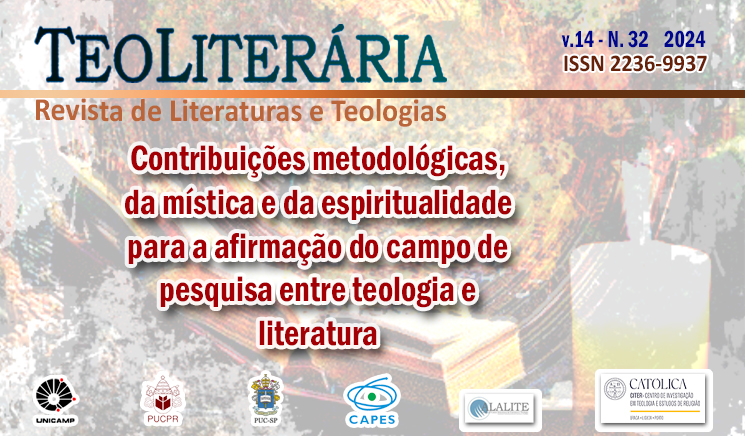O Aspecto Religioso na Obra Crime e Castigo de Dostoiévski
DOI:
https://doi.org/10.23925/2236-9937.2024.64908Palabras clave:
Cristianismo, Conversão, Dostoiévski, Crime e castigoResumen
Este trabalho tem por finalidade analisar a importância do cristianismo na vida e obra do escritor russo Fiodor Dostoiévski e apresentar sua concepção peculiar sobre o cristianismo russo e sua ideia de que o povo da Rússia carregaria a essência do cristianismo dentro de si. Usaremos para essa análise como obra de apoio o seu Diário de um escritor. Ainda, buscaremos demonstrar como Dostoiévski fora capaz de compreender os conflitos políticos e sociais de seu tempo e captar as ideias que efervesciam na Rússia do século XIX, introduzindo-as na boca de seus mais diversos personagens naquilo que ficou conhecido pela crítica literária como romance polifônico. Para fazer essa contraposição exporemos as críticas de Dostoiévski ao filósofo revolucionário russo Nicolai Tchernichevski. Tentaremos, por fim, perquirir se há alguma influência religiosa relevante para o deslinde do romance Crime e castigo em especial se é possível afirmar, com base exclusivamente na mencionada obra, que houve uma efetiva conversão ao cristianismo do personagem principal Rodion Românovitch Raskolnikov.
Citas
ALEKSIÉVITCH, Svetlana. O fim do homem soviético. Trad. Lucas Simone, São Paulo: Companhia das Letras, 2016.
ANTONIASSE, Samuel Junqueira. Diário de um homem supérfluo, de Turguêniev: caracterização de um tipo. Dissertação de mestrado apresentada para a Faculdade de Letras e Ciências Humanas da Universidade de São Paulo, 2016.
BAKHTIN, Mikhail. Problemas da obra de Dostoiévski. Trad. Sheila Grillo e Ekaterina Vólkova Américo. São Paulo: editora 34, 2022.
BERLIN, Isaiah. Russian thinkers. London: Penguin Books, 1994.
DOSTOIÉVSKI, Fiodor. Letters of Fyodor Michailovitch Dostoevsky to His Family and Friends. Trad. Ethel Colburn Mayne, London: Chatto and Windus, 2ª ed., 1917.
DOSTOIÉVSKI, Fiodor. The Diary of a Writer. Trad. Boris Brasol. New York: George Braziller, 1919.
DOSTOIÉVSKI, Fiodor. Obra completa. Trad. Natália Nunes. Rio de Janeiro: Companhia Aguilar, 1963. v. 1.
DOSTOIÉVSKI, Fiodor. Memórias de subsolo. Trad. de Boris Schnaiderman, São Paulo: editora 34, 6ª ed., 2009
DOSTOIÉVSKI, Fiodor. O crocodilo e Notas de inverno sobre impressões de verão. Trad. de Boris Schnaiderman, São Paulo: editora 34, 4ª ed., 2011.
DOSTOIÉVSKI, Fiodor. Crime e castigo. Trad. de Paulo Bezerra, São Paulo: editora 34, 8ª ed., 2019.
DOMINGUES, C. J. T. L. Nikolai Gavrilovitch Tchernichévski e a intelligentsia russa: filosofia e ética na segunda metade do século XX. Dissertação de Mestrado. Niterói, Universidade Federal do Fluminense, 2015.
FARJADO, Jéssica de Souza. A representação dos tipos “homem supérfluo” e “raznotchínets” na novela Púnin e Babúrin, de Ivan Turguêniev. Tese de doutorado apresentada para a Faculdade de Letras e Ciências Humanas da Universidade de São Paulo, 2020.
FEUERBACH, Ludwig. A essência do cristianismo. Trad. José da Silva Brandão, Petrópolis: Vozes, 2012.
FRANK, Joseph. Dostoiévski: os efeitos da libertação, 1860 a 1865. Trad. de Geraldo Gerson de Souza, São Paulo: edusp, 2002.
FREUD, Sigmund. Dostoievski e o Parricídio. In.: Freud, S. Obras psicológicas completas de Sigmund Freud: Edição Standard Brasileira. Rio de Janeiro: Imago. Volume XXI, p. 187-203, 1996.
HOBSBAWM, Eric. A era das revoluções. Trad. Maria Tereza Teixeira e Marcos Penchel, 38ª ed., Rio de Janeiro: Paz e Terra, 2017.
JAMES, William. As variedades da experiência religiosa. Trad. Octavio Mendes Cajado, São Paulo: Cultrix, 1991.
LUKÁCS, George. Introdução à publicação alemã de O que fazer? de Tchernichévski (1951). Traduzido por Gabriel S. Philipson. In.: ArteFilosofia, Revista do Programa de Pós-graduação em Estética e Filosofia da Arte da UFOP, n. 22, Ouro Preto, julho de 2017, p. 4-29.
NABOKOV, Vladimir. Lições de literatura russa. Trad. Jorio Dauster, São Paulo: Três Estrelas, 2014.
ODO, Susan McReynolds. Outro Deus: Dostoiévski, Cristianismo e o Século XX. Trad. Paula Vianna e Adauto Villela. In.: Numen: revista de estudos e pesquisa da religião, Juiz de Fora, v. 19 n. 1, 2016, p. 69-81.
SCHILLER, Friedrich. A educação estética do homem. Trad. Roberto Schwarz e Mário Suzuki, São Paulo: Ed. Iluminuras. 4ª ed. 2002.
TCHERNYCHEVSKI, Nicolaï. Textes philosophiques choisis. Trad. Alice Orane, Rodov, Piatigorski. Moscou: Editions politiques d’Etat, 1957.
TCHERNYCHEVSKI, Nicolai. O que fazer?, Trad. Angelo Segrillo, Curitiba: Editora Prismas, 2015.
TCHIRKÓV, Nikolai. O estilo de Dostoiévski. Trad. Paulo Bezerra, São Paulo: editora 34, 2022.
VILLELA, Annibal. O Desenvolvimento Industrial da Rússia, 1860-1913. In.: Revista brasileira de Economia, Rio de Janeiro, 24(1): 31/58, jan./mar. 1970, pp. 31-58.
Publicado
Cómo citar
Número
Sección
Licencia
Derechos de autor 2024 TEOLITERARIA - Revista de Literaturas e Teologias

Esta obra está bajo una licencia internacional Creative Commons Atribución 4.0.
La Teoliteraria - Revista Brasileira de Literaturas e Teologías es detentora de los derechos autorales de todos los artículos publicados por ella. La reproducción total de los artículos de ésta revista en otras publicaciones, o para cualquier otro fin, por cualquier medio requiere autorización por escrito del editor de este periódico. Reproducciones parciales de artículos (resúmenes, abstrac, más de 500 palabras de texto, tablas, figuras y otras ilustraciones) deberán tener permiso por escrito del editor y de los autores.

